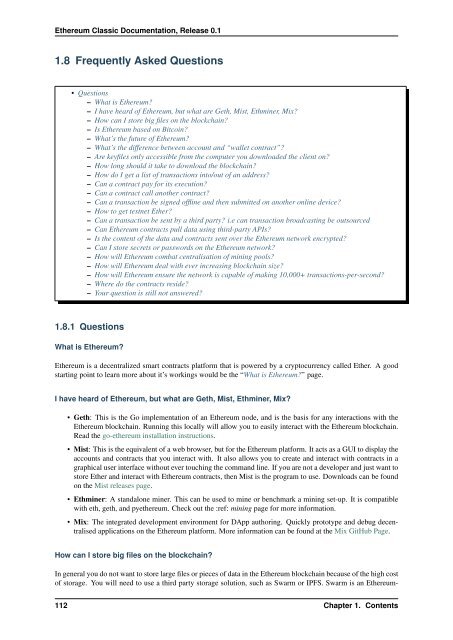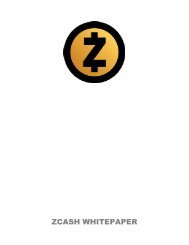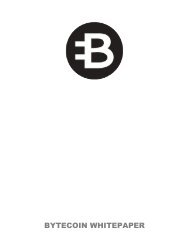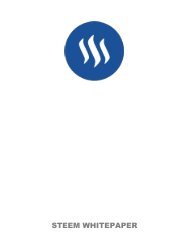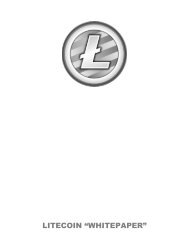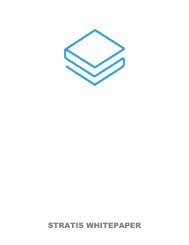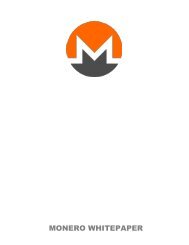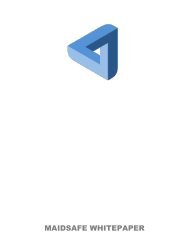Whitepaper - Ethereum Classic With Cover
Create successful ePaper yourself
Turn your PDF publications into a flip-book with our unique Google optimized e-Paper software.
<strong>Ethereum</strong> <strong>Classic</strong> Documentation, Release 0.1<br />
1.8 Frequently Asked Questions<br />
• Questions<br />
– What is <strong>Ethereum</strong>?<br />
– I have heard of <strong>Ethereum</strong>, but what are Geth, Mist, Ethminer, Mix?<br />
– How can I store big files on the blockchain?<br />
– Is <strong>Ethereum</strong> based on Bitcoin?<br />
– What’s the future of <strong>Ethereum</strong>?<br />
– What’s the difference between account and “wallet contract”?<br />
– Are keyfiles only accessible from the computer you downloaded the client on?<br />
– How long should it take to download the blockchain?<br />
– How do I get a list of transactions into/out of an address?<br />
– Can a contract pay for its execution?<br />
– Can a contract call another contract?<br />
– Can a transaction be signed offline and then submitted on another online device?<br />
– How to get testnet Ether?<br />
– Can a transaction be sent by a third party? i.e can transaction broadcasting be outsourced<br />
– Can <strong>Ethereum</strong> contracts pull data using third-party APIs?<br />
– Is the content of the data and contracts sent over the <strong>Ethereum</strong> network encrypted?<br />
– Can I store secrets or passwords on the <strong>Ethereum</strong> network?<br />
– How will <strong>Ethereum</strong> combat centralisation of mining pools?<br />
– How will <strong>Ethereum</strong> deal with ever increasing blockchain size?<br />
– How will <strong>Ethereum</strong> ensure the network is capable of making 10,000+ transactions-per-second?<br />
– Where do the contracts reside?<br />
– Your question is still not answered?<br />
1.8.1 Questions<br />
What is <strong>Ethereum</strong>?<br />
<strong>Ethereum</strong> is a decentralized smart contracts platform that is powered by a cryptocurrency called Ether. A good<br />
starting point to learn more about it’s workings would be the “What is <strong>Ethereum</strong>?” page.<br />
I have heard of <strong>Ethereum</strong>, but what are Geth, Mist, Ethminer, Mix?<br />
• Geth: This is the Go implementation of an <strong>Ethereum</strong> node, and is the basis for any interactions with the<br />
<strong>Ethereum</strong> blockchain. Running this locally will allow you to easily interact with the <strong>Ethereum</strong> blockchain.<br />
Read the go-ethereum installation instructions.<br />
• Mist: This is the equivalent of a web browser, but for the <strong>Ethereum</strong> platform. It acts as a GUI to display the<br />
accounts and contracts that you interact with. It also allows you to create and interact with contracts in a<br />
graphical user interface without ever touching the command line. If you are not a developer and just want to<br />
store Ether and interact with <strong>Ethereum</strong> contracts, then Mist is the program to use. Downloads can be found<br />
on the Mist releases page.<br />
• Ethminer: A standalone miner. This can be used to mine or benchmark a mining set-up. It is compatible<br />
with eth, geth, and pyethereum. Check out the :ref: mining page for more information.<br />
• Mix: The integrated development environment for DApp authoring. Quickly prototype and debug decentralised<br />
applications on the <strong>Ethereum</strong> platform. More information can be found at the Mix GitHub Page.<br />
How can I store big files on the blockchain?<br />
In general you do not want to store large files or pieces of data in the <strong>Ethereum</strong> blockchain because of the high cost<br />
of storage. You will need to use a third party storage solution, such as Swarm or IPFS. Swarm is an <strong>Ethereum</strong>-<br />
112 Chapter 1. Contents


